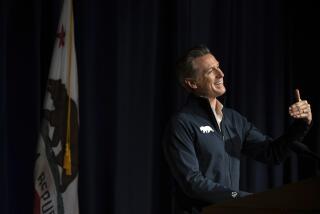Brown uses vetoes to press for Prop. 30
SACRAMENTO — The message was in the vetoes.
With a deadline approaching, Gov. Jerry Brown had hundreds of bills heaped on his desk, but just one key point to get across to voters: Sacramento had to take the tough medicine on fiscal discipline.
“California faces fiscal challenges unparalleled since the Great Depression,” Brown wrote in rejecting a bill that would have made it easier for the survivors of public safety workers to collect death benefits. “While much progress has been made to reduce our structural deficit, balance our budget, reform workers’ compensation and rein in spiraling pension costs — much work remains.”
In veto after veto, Brown cast himself as the stern parent, upbraiding a spendthrift child.
It was part of a broad effort to bolster the chances of his November ballot initiative, Proposition 30, which seeks billions of dollars in new taxes to help balance the budget. By demonstrating he was willing to say no to lawmakers, Brown could show that this tax increase wouldn’t end up squandered on legislative pet projects.
The vetoes angered some of Brown’s Democratic allies. But by the time the dust settled Monday, he had given his key liberal supporters just enough so they could declare some victory.
On immigration, he waited until the eleventh hour to weigh in. He signed a bill allowing hundreds of thousands of illegal immigrants to obtain driver’s licenses — but then vetoed another that sought to blunt federal deportation efforts.
Brown pleased labor leaders by signing into law a measure that helps establish a state-run retirement plan for low-wage, private-sector workers. Then he rejected measures that would have extended labor protections to housekeepers and farmworkers.
It was a delicate balancing act.
The amount of time and detail Brown invested in the typically mundane activity of bill signing underscored the urgency — and fragility — of the Proposition 30 campaign.
Although surveys show a majority of Californians support the proposal, a recent USC/Los Angeles Times poll found support slipping for the tax measure, which so far has encountered only nominal opposition.
Voters appear wary of sending more cash to Sacramento in the wake of financial scandals, legislative pay raises and the escalating costs for a multibillion-dollar high-speed rail project.
But the governor has said that unless his initiative to increase sales tax and levies on upper-income earners is approved, he will have to slash billions of dollars from the state’s public schools and universities.
Brown was willing to anger Democrats to make his point that fiscal discipline was now Sacramento’s priority.
His messages after vetoing a bill, personally crafted and edited, were often part lecture and part sales pitch. Indeed, with little in the way of television or radio advertising for Proposition 30, they could be considered the outline of his tax campaign.
Brown vetoed proposals to undo past budget cuts and quashed efforts to increase regulation. Notably, he turned back a campaign by legislative leaders to revive redevelopment programs throughout California, which he had eliminated last year to save billions of dollars.
On Monday, immigrant rights advocates — who have been strong Brown supporters — expressed outrage over his veto of the Trust Act — a bill intended to bar local officials from helping federal authorities deport undocumented immigrants.
It would have been the first law of its kind in the nation.
“We expected him to be a champion for immigrants, but by his failure to take leadership, he has doomed thousands,” Reshma Shamasunder, executive director of the California Immigrant Policy Center, said of Brown.
Although the bill would have prohibited local law enforcement officials from detaining undocumented immigrants unless they had been convicted or charged with a serious or violent felony, Brown said the proposal was “fatally flawed” because it omitted serious crimes, including child abuse and drug trafficking. In his veto message, however, he pledged to work with lawmakers and revisit the issue.
Labor leaders also were appalled that Brown had rejected a bill of rights for housekeepers and regulations to protect farmworkers from heat exhaustion.
In vetoing the domestic workers bill, he cited costs to the state of more than $200 million a year.
Even nutrition advocates bore the brunt of Brown’s veto pen when he rejected rules dictating what charter schools could serve in their cafeterias.
“Pupil nutrition is profoundly important,” the governor wrote, “but so also is the fundamental premise of charter schools that they be free from large portions of the voluminous state Education Code.”
In other messages, Brown wielded his pen against what he saw as excessive government regulation, killing several measures that sought to raise traffic ticket fines and give local jurisdictions new mandates.
What Brown decided to sign was carefully chosen.
In a nod to Republicans, he approved a bill that would authorize construction of a statue of former President Reagan, who famously declared, “Government is the problem.”
In a signing message, he recalled the conservative icon’s time as California governor, saying Reagan had faced a challenge similar to his own.
“Even in those days, he demonstrated courage and unique leadership ability,” Brown wrote, “even to the point of raising California taxes when he saw they were needed.”
More to Read
Start your day right
Sign up for Essential California for news, features and recommendations from the L.A. Times and beyond in your inbox six days a week.
You may occasionally receive promotional content from the Los Angeles Times.






